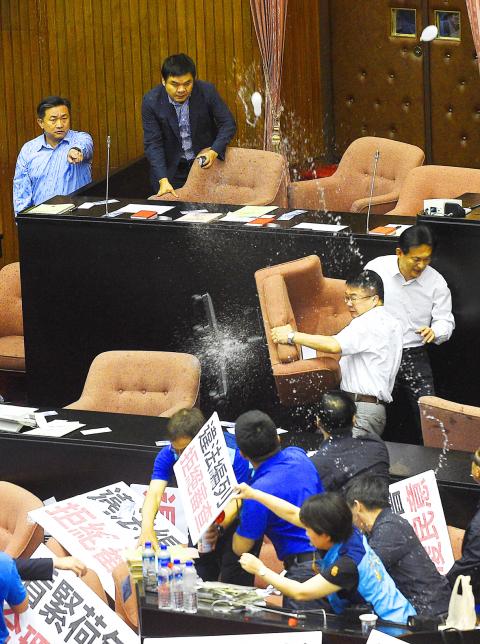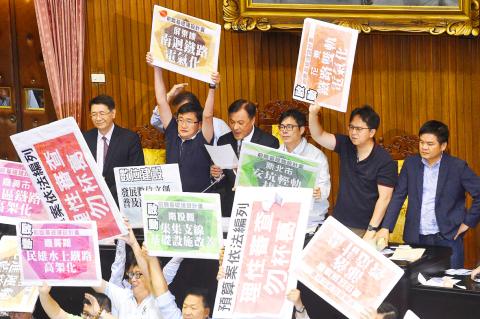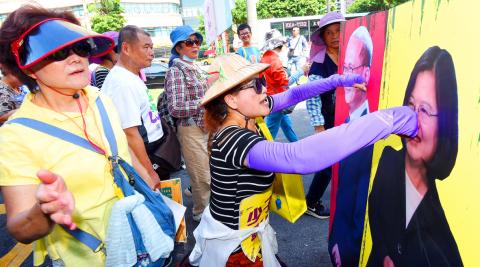After a presentation on the Forward-looking Infrastructure Development Program by Premier Lin Chuan (林全) was yesterday once again blocked by Chinese Nationalist Party (KMT) legislators, Legislative Speaker Su Jia-chyuan (蘇嘉全) bypassed a legislative question-and-answer session to send the Executive Yuan’s budget proposals to a committee review.
As soon as Su announced the start of the plenary session, KMT legislators, who had stayed in the chamber overnight, started shouting slogans, sounding air horns, blowing whistles, and throwing water balloons and fake banknotes to prevent Lin from reaching the podium.
KMT caucus secretary-general Lin Wei-chou (林為洲) threw a water balloon at DPP Legislator Wu Ping-jui (吳秉叡). Wu countered by tossing a chair toward Lin Wei-chou, which missed.

Photo: Chen Chih-chu, Taipei Times
DPP Legislator Chuang Ruei-hsiung (莊瑞雄) threw water from a vacuum flask at KMT lawmakers, who hit back with water balloons. Chuang then lifted up a chair and threatened to hurl it toward his KMT colleagues.
DPP caucus secretary-general Lee Chun-yi (李俊俋) scuffled with KMT Legislator Alex Fei (費鴻泰), while DPP Legislator Su Chen-ching (蘇震清) and KMT Legislator Hsu Chih-jung (徐志榮) also came to blows.
No more than five minutes into the session, the situation was completely out of control, forcing Su to end the meeting after advising Lin to leave.

Photo: Chen Chih-chu, Taipei Times
Su later sought to resolve the deadlock by calling a cross-caucus negotiation, which the KMT caucus refused to attend.
During the negotiation, People First Party caucus whip Lee Hung-chun (李鴻鈞) said that the Special Act on the Forward-looking Infrastructure Development Program (前瞻基礎建設特別條例), which was passed last week, stipulates that the budget cap for the first stage of the program is set at NT$420 billion (US$13.8 billion) over four years, but the budget proposal by the Executive Yuan was for only NT$108.9 billion over two years.
The Cabinet should at least outline its budget plans over four years before legislators can conduct a more detailed review of the funds needed for the early stages of the program’s 65 sub-projects, Lee said.

Photo: Liu Hsin-de, Taipei Times
New Power Party (NPP) caucus whip Hsu Yung-ming (徐永明) said the NPP hopes that Lin can brief legislators on the program before the budget proposal proceeds to committee review, so the proceedings would conform to due legislative procedure.
Whether the Cabinet has breached the act in its way of budgeting the program is “subject to different interpretations,” Hsu said, suggesting that there is ambiguity in the act.
He said that Lin’s presentation and the question-and-answer session should be postponed until Monday.
Su agreed, adding that he would consult with the KMT caucus for its opinion.
Speaking by telephone, Lin Wei-chou said that the KMT would not accept the terms proposed by Su during the negotiation.
In an unexpected move, Su re-emerged in the chamber shortly after the negotiations and announced that a motion by the DPP to send the budget proposal to committee review on Monday was to be voted on, despite KMT legislators’ strong protests.
The motion was passed after gaining the support of the DPP caucus, which has a legislative majority.
The KMT caucus in the afternoon held a news conference at the legislature, saying it would report Su to the Discipline Committee and file a lawsuit with an administrative court to determine the legitimacy of the motion.
Su’s bypassing of a question-and-answer session breached the Act Governing the Exercise of Legislative Power (立法院職權行使法) and deprived legislators of their right to question officials, Lin Wei-chou said, demanding that Su step down.
Budget proposals put forward by the former KMT administration had also proceeded to committee review without former premier Jiang Yi-huah (江宜樺) briefing the legislature, KMT Legislator Lai Shyh-bao (賴士葆) quoted Su as saying.

AGING: As of last month, people aged 65 or older accounted for 20.06 percent of the total population and the number of couples who got married fell by 18,685 from 2024 Taiwan has surpassed South Korea as the country least willing to have children, with an annual crude birthrate of 4.62 per 1,000 people, Ministry of the Interior data showed yesterday. The nation was previously ranked the second-lowest country in terms of total fertility rate, or the average number of children a woman has in her lifetime. However, South Korea’s fertility rate began to recover from 2023, with total fertility rate rising from 0.72 and estimated to reach 0.82 to 0.85 by last year, and the crude birthrate projected at 6.7 per 1,000 people. Japan’s crude birthrate was projected to fall below six,

US President Donald Trump in an interview with the New York Times published on Thursday said that “it’s up to” Chinese President Xi Jinping (習近平) what China does on Taiwan, but that he would be “very unhappy” with a change in the “status quo.” “He [Xi] considers it to be a part of China, and that’s up to him what he’s going to be doing, but I’ve expressed to him that I would be very unhappy if he did that, and I don’t think he’ll do that. I hope he doesn’t do that,” Trump said. Trump made the comments in the context

SELF-DEFENSE: Tokyo has accelerated its spending goal and its defense minister said the nation needs to discuss whether it should develop nuclear-powered submarines China is ramping up objections to what it sees as Japan’s desire to acquire nuclear weapons, despite Tokyo’s longstanding renunciation of such arms, deepening another fissure in the two neighbors’ increasingly tense ties. In what appears to be a concerted effort, China’s foreign and defense ministries issued statements on Thursday condemning alleged remilitarism efforts by Tokyo. The remarks came as two of the country’s top think tanks jointly issued a 29-page report framing actions by “right-wing forces” in Japan as posing a “serious threat” to world peace. While that report did not define “right-wing forces,” the Chinese Ministry of Foreign Affairs was

PREPAREDNESS: Given the difficulty of importing ammunition during wartime, the Ministry of National Defense said it would prioritize ‘coproduction’ partnerships A newly formed unit of the Marine Corps tasked with land-based security operations has recently replaced its aging, domestically produced rifles with more advanced, US-made M4A1 rifles, a source said yesterday. The unnamed source familiar with the matter said the First Security Battalion of the Marine Corps’ Air Defense and Base Guard Group has replaced its older T65K2 rifles, which have been in service since the late 1980s, with the newly received M4A1s. The source did not say exactly when the upgrade took place or how many M4A1s were issued to the battalion. The confirmation came after Chinese-language media reported